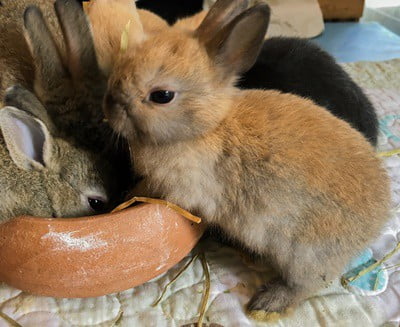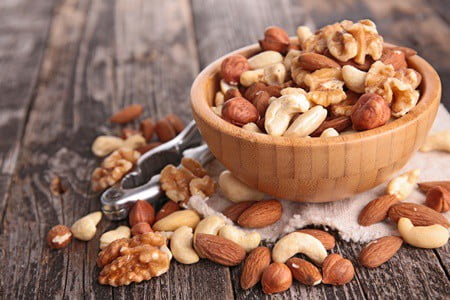Nuts are high in fats and protein, along with some fibers, vitamins, and minerals, such as potassium and magnesium. Popular nuts that include Brazil nuts, cashews, hazelnuts, pine nuts, monkey nuts (peanuts), and pecans. But are these types of nuts safe for rabbits to eat?
While nuts are considered safe for rabbits in very tiny amounts, it’s best to avoid them. Nuts are high in fats and carbohydrates, and rabbits depend on high-fiber and low-calorie foods, such as hay.
A rabbit’s digestive system cannot handle foods that are high in fats, carbohydrates, and energy. Too much fat and calories, and too little fiber in a rabbit’s diet, increases the risk of obesity and future health complications. An excess of carbohydrates may cause indigestion problems, intestinal problems, such as GI stasis or fatty liver disease.
Are Rabbits Allowed Nuts?
Rabbits are strict herbivores. They rarely get access to nuts, fruits, and other high-sugar, high-fat, or starchy foods.
Rabbits have evolved to meet their nutritional needs via a high-fiber and low-energy diet. In fact, they have a specialized pouch called the cecum that is responsible for digesting cellulose fiber.
Too many carbs from nuts can imbalance the complex flora of a rabbit’s cecum. This increases a rabbit’s risk of “poopy butt syndrome,” a condition where a rabbit’s mushy poop cakes onto its behind.
Mushy poop or loose cecotropes is often a sign of cecal dysbiosis, which can lead to more serious health complications.
What Nutrients Are Found in Nuts?
To understand why nuts aren’t healthy for rabbits, it helps to understand the nutrient content in nuts and compare them with hay. The following table breaks down the nutrients in different types of nuts:
| 1-oz | Almond | Hazelnut | Pistachio | Cashew | Pecan | Brazil |
|---|---|---|---|---|---|---|
| Fiber (g) | 3.5 | 2.7 | 2.9 | 0.9 | 2.7 | 2.1 |
| Carbs (g) | 6.1 | 4.7 | 7.8 | 8.6 | 3.9 | 3.5 |
| Proteins (g) | 6 | 4.2 | 5.8 | 5.2 | 2.6 | 4.1 |
| Fats (g) | 14 | 17.2 | 12.9 | 12.4 | 20.4 | 18 |
| Cals (g) | 163 | 178 | 159 | 157 | 196 | 186 |
A rabbit’s diet should be made up of 80 to 90% hay because it is dense in fiber and low in carbohydrates, fat, and calories. 1 ounce of grass hay has 56.25 calories, compared to 163 calories in 1 ounce of almonds.
Hay offers more satiety to rabbits because it contains more fiber. A rabbit will have to go through a much larger quantity of nuts to reach the same level of fullness as hay, gram for gram.
Because nuts are much more nutrient-dense than hay, eating too much can lead to obesity issues in rabbits.
According to the International Journal of Obesity, a high-fat diet may also lead to vascular dysfunction (dysfunction of large arteries) in rabbits. This indicates that a high-fat diet also increases a rabbit’s risk of heart disease.
Rabbits need at least a bundle of high-quality hay that’s just as big as they are daily. Ideally, fresh hay should be available for rabbits at all times. Giving them access to kiln-dried grass or growing grass for grazing can be excellent for their health as well.
Hay is packed with fiber and enough micronutrients (vitamins and minerals) to keep your rabbit is good shape. You can supplement your rabbit’s diet with leafy greens, some pellets, and fruits.
Vitamins and Minerals in Nuts
| Type of Nut | Important Nutrients |
|---|---|
| Almonds | Calcium and vitamin E |
| Cashews | Iron |
| Hazelnuts | Potassium, vitamin E, and folate |
| Pecans | Antioxidants |
| Pine nuts | Vitamin E and the amino acid, arginine |
| Pistachios | Potassium, protein, resveratrol (an antioxidant) and plant sterols |
| Brazil nuts | Selenium |

What if my Rabbit Overeats Nuts?
If it’s on a healthy diet, the worst that could happen is that it will pass some strange poop or have a tummy ache. If stomach problems persist for more than 12 hours, see a vet.
In addition to being high in carbohydrates and fats, nuts are also high in vitamins and minerals that can cause harm to rabbits when consumed in excessive amounts.
- An excess of folic acid can harm your rabbit’s nervous system.
- An excess of vitamin A can impair your rabbit’s joints.
- Too much calcium in the diet can lead to sludge-like deposits in a rabbit’s body. These deposits crystallize, cause urinary tract infections and negatively affect internal organs.
Many plant-based foods (including nuts) contain an antinutrient called oxalate. Oxalates are naturally-occurring toxins that can impair your rabbit’s urinary tract and cause itchiness in the mouth or skin.
How Do Nuts Affect a Rabbit’s Gut?
Nuts are rich in carbohydrates and fat while being low in fiber. A rabbit’s gut flora can be easily disturbed.
Anything that upsets the delicate balance of bacteria in a rabbit’s gut can cause bad bacteria to proliferate. These bad bacteria feed on sugar and produce toxins that can be harmful or life-threatening to a rabbit.
On the other hand, healthy cecal fermentation is critical for a rabbit’s gut flora. This fermentation process produces cecal pellets (cecotropes or night feces) that are to be re-ingested.
Through coprophagy, a rabbit can redigest food that has been passed out and introduce more minerals, nutrients and other vital nutrients into its system. Some reports also suggest that the bacteria from reingested pellets allow the food to digest more effectively in the stomach.
What Happens When Rabbits Eat Nuts?
If you’ve already fed your rabbit almonds in the past, this won’t cause any harm. It’s just that too much can cause digestive disorders.
Furthermore, because nuts don’t offer many nutritional benefits to rabbits, you’re better off keeping them away from your rabbit’s diet altogether.
Your rabbit needs fiber for nutrition, but it also needs fiber to keep its digestive tract running. Nuts are full of fat and starch and can thus, interfere with a rabbit’s digestive process. Too many nuts in a rabbit’s diet can lead to uncomfortable symptoms, such as bloating and stomach pain.
An excess of carbohydrates from nuts and fruits can lead to bad bacteria overgrowth in the gut, gastrointestinal stasis, and constipation.
A healthy rabbit carries low numbers of yeast. Too much sugar and starch and too little fiber cause yeast overgrowth, resulting in soft stools.
In severe cases, this may lead to diarrhea. Too much simple sugars in the diet allow the bacterium, Clostridium to release iota-toxin, which can lead to enterotoxemia and death.
Without adequate fiber, a rabbit’s stomach and cecum cannot empty sufficiently. This causes fecal matter to accumulate in the gut and disrupt the gut fauna.
When domestic rabbits are not forming healthy cecotropes, they’re missing out on a vital part of their nutrition. This increases their risk for a lethal shift in their cecal flora.
Dietary Considerations for Rabbits
- A diet that lacks cellulose is guaranteed to cause vitamin and mineral deficiencies in rabbits.
- It slows down the movement of food in the gastrointestinal tract, leading to cecal motility disorders.
If you feed your rabbit too much fat or starch and too little fiber, it’s digestive tract will reach an immediate halt.
Look for signs of gastrointestinal comfort if you’ve recently fed your rabbit any nuts. If your rabbit refuses to eat, produces loose, discolored or watery pellets or does not poop for 12 hours, take it to a rabbit-savvy vet immediately.
Rabbits with digestive issues should not be given anything other than water and hay. The best way to keep your rabbit’s digestive tract running smoothly is to maximize its hay intake, minimize high-sugar foods, such as fruits and eliminate high-fat, high-carb and low-fiber foods, such as nuts.
A nut or two will not kill your rabbit, but nuts are unhealthy foods. Long-term use of nuts can even be toxic to rabbits. Nuts are high in nutrients that are bad for rabbits and very low in nutrients that are good for them.
Therefore, even though a couple of nuts every now and then will not kill a rabbit, it’s better to stick to healthier treats, such as fresh leafy greens.

